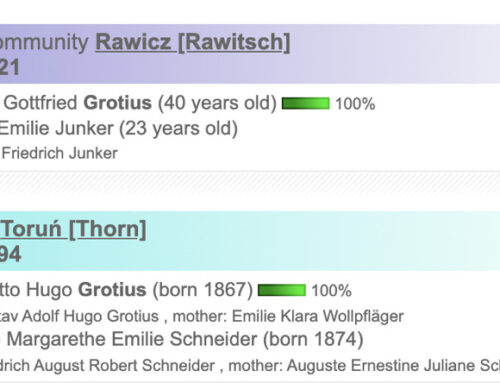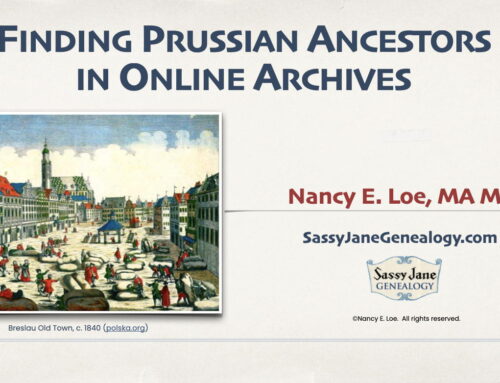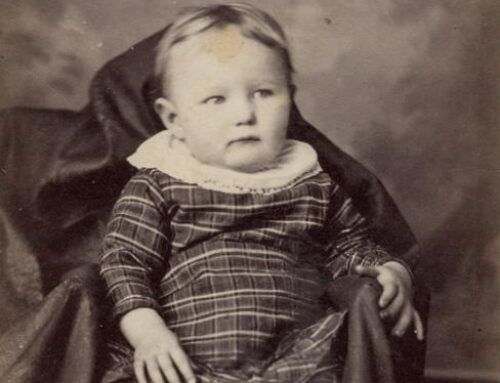Donating Your Family’s Papers to an Archives is today’s post, designed to help you with legal considerations once you and an institution have agreed to the acquisition.
Last week we talked about how and where to donate your family’s original papers. This week I want to talk about specific points in a deed of gift. The deed of gift is a legal contract and as such has clauses that outline the rights and responsibilities of both the donor and the recipient.
The archivist for the institution should be able to supply you with a basic document similar to this sample deed:
DEED OF GIFT
SURNAME Papers
to the
RECIPIENT ARCHIVES
1. Subject to the terms, conditions, and restrictions hereinafter set forth, I,(name of donor),(hereinafter referred to as the Donor), hereby irrevocably give, donate and convey to the RECIPIENT INSTITUTION for deposit in the (name of department), the papers and other historical materials (hereinafter referred to as the Materials) which are described in Appendix A, attached hereto.
2. Legal ownership, title, and all rights to the Materials shall pass to the RECIPIENT INSTITUTION. Donor acknowledges that upon execution of this Deed of Gift, the Materials irrevocably become the property of RECIPIENT INSTITUTION.
3. The Donor and her family shall be permitted freely to examine any of the Materials during the regular working hours of the (name of department) after the collection has been processed.
4. Subject to the restrictions imposed herein, any of the Materials that are determined to have no permanent value by (name of department) staff will be ___discarded (or) ___returned to the Donor.
5. In the event that the RECIPIENT INSTITUTION or its successor cannot or will no longer administer the preservation and use of the Materials, they will then be returned to the Donor, or at the Donor’s request, a suitable institution will be located and a transfer effected.
6. Credit for the display in exhibitions or the reproduction in print or electronic media shall be required and shall read: “SURNAME Papers, name of department, RECIPIENT INSTITUTION.”
7. By execution of this Deed of Gift, Donor expressly represents and warrants to RECIPIENT INSTITUTION that he or she is the sole lawful owner of title to the Property. Donor further represents that the Property is free and clear from any and all encumbrances, that there has been no prior pledge, option or gift of any part thereof to any person, and that Donor has the right to give or transfer the Property.
8. The Internal Revenue Service has determined that RECIPIENT INSTITUTION is organized and operated exclusively for educational purposes and is exempt from federal income tax pursuant to Sections 501(a) and (c)(3) of the Internal Revenue Code. does not advise donors on tax matters and suggests that Donor direct any questions regarding donations as charitable contributions to Donor’s tax advisor or an office of the Internal Revenue Service. RECIPIENT INSTITUTION does not appraise donations but will make the Property available for appraisal upon the request of Donor.
9. Loan of Materials from the collection shall be at the discretion of the (director of department).
10. In the event that the Donor may from time to time hereafter give, donate and convey to the RECIPIENT INSTITUTION as a gift to the (name of department), additional papers and other historical materials, title is given over to the RECIPIENT INSTITUTION, and all of the foregoing provisions of this Deed of Gift shall be applicable to such additional papers and other historical materials. A description of the additional papers and other historical materials so donated and delivered shall be prepared and attached hereto as successively numbered appendices.
Signature of the Donor: _________________________________
Date: _______________________________________________
Name (print): __________________________________________
Telephone: ___________________________________________
Street Address: _________________________________________
City/State/Zip: _________________________________________
E-mail address: _________________________________________
The foregoing gift from the Donor is accepted on behalf of the RECIPIENT INSTITUTION subject to the terms, conditions and restrictions hereinbefore set forth.
Signature for the
Name (print): __________________________________________
Date:____________________
APPENDIX A – Date Donated
Description of general contents and size of collection
Photos
Oversized prints
Motion Pictures
Business records
Travel records
Personal papers
Diaries/appointment books
APPENDIX B – Date Donated
Description of general contents and size of collection
What do the clauses mean?
Clauses 1 and 2 convey the ownership and legal rights, including copyright, from the donor to the archives.
Clause 3 insures reasonable access for the donor.
Clause 4 gives the archives latitude to discard or return materials that don’t meet collecting policy. An example would be a collection of Abraham Lincoln letters that was donated to an archives. The donor’s family also boxed up 20 years of newsletters from a lawn-care company. Lincoln we cared about, the lawns, not so much.
Clause 5 determines what happens to the collection if the recipient is no longer able to care for the collection. This is a rare but necessary provision that protects both donor and recipient.
Clauses 6 and 9 cover use of the collections.
Clauses 7 and 8 clarify that the donor owns the collection and can convey rights and that the donation is a charitable one.
Clause 10 provides for additional donations without having to renegotiate the terms of the gift.
If you have other concerns about the donation of your family’s papers, discuss them with the archivist and when agreement is reached, add the new terms to the deed.
Clearly, the decision about donating your family’s papers to an archives is a serious one needing forethought.





Leave a Reply